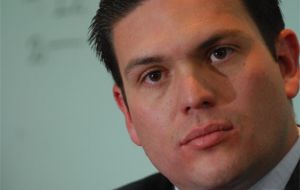MercoPress. South Atlantic News Agency
Colombia forces to continue military operations despite FARC unilateral cease fire
 Minister Pinzón: until all peace accords are signed, no cease fire
Minister Pinzón: until all peace accords are signed, no cease fire Colombian Minister of Defence Juan Carlos Pinzón said that security forces will continue with military operations in the country despite the unilateral two-month cease fire declared by the guerrilla group FARC, which becomes effective Monday 24:00 hours.
In a brief statement the Minister underlined that it is “the constitutional duty” of Colombia’s security forces “to pursue all those criminals that have committed crimes all along these years as has been the case with FARC, the Revolutionary Armed Forces of Colombia”.
“This is a very clear position which is responsibility of law enforcement officers to continue working with determination to pursue all those that have been involved in violation of all types of codes, norms and have attempted against lives and the honour of Colombians”, added the ministerial release.
The announcement is clearly the position that has been sustained by President Juan Manuel Gomez which has been to underline that the peace process negotiations which started Monday in Havana will not be accompanied by a cease fire until all the accords putting an end to the conflict are signed.
Minister Pinzón reiterated that the order stands: “combat the illegal groups all along the national territory”.
FARC chief negotiator and second in command Luciano Marin Arango, also known as Ivan Marquez, read a document earlier on Monday in which the organization’s Secretariat decrees the unilateral cease fire . The announcement was done when he arrived at Havana’s Conventions Palace and before the first round of dialogue with the negotiators from the Colombian government.
“The FARC Secretariat orders all guerrilla units in all the national geography the cease of all military offensive operations against security forces and the acts of sabotage against public or private infrastructure during the period extending from zero hours of November 20 to January 20 of 2013”.
Marin Arango said it was “a contribution made to strengthen the climate of understanding necessary so that the parties that are starting the dialogue achieve the purpose desired by all Colombians”.
The first face-to-face meeting is aimed at ending five decades of conflict in which some 600.000 people have died and millions have been displaced.
The negotiations in Havana are expected to focus initially on the issue of land reform in Colombia, as it was a major reason for the uprising that brought about the establishment of the FARC (Revolutionary Armed Forces of Colombia) in the early 1960s.
Four other points will be discussed: the end of armed conflict; guarantees for the exercise of political opposition and citizen participation; drug trafficking; and the rights of the victims of the conflict.
During the official launch of the talks in Norway last month, FARC rebels had called the government to agree a truce. But the Colombian government said at the time it would not repeat the mistakes of the past - a reference to the last peace efforts, which went on from 1999 to 2002.
At the time, a huge area controlled by the rebels in the south of the country was demilitarised, which, according to critics, allowed them to rearm and weakened their will to seek a peace agreement.




Top Comments
Disclaimer & comment rules-

Read all commentsThis is a disastrous course that could derail the whole peace process, a ceasefire is always a vital step on the road to lasting peace, in Northern Ireland for example there was a ceasefire for almost 10 years before the official conclusion of the peace process. Even bloody Israel has agreed to a ceasefire, and they're no doves!
Nov 24th, 2012 - 12:08 am 0Commenting for this story is now closed.
If you have a Facebook account, become a fan and comment on our Facebook Page!